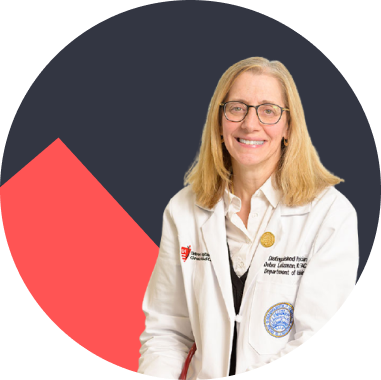Approaching Medicine with Zest and Vigor with
Dr. Debra Leizman

A Conversation with Dr. Debra Leizman
“There is no question: You need to read, read, read. But you really learn the most by talking to a patient, examining the patient, and being with the patient.”
Bio
Debra Leizman, MD, FACP, is the Director of Medical Student Education at University Hospitals Cleveland Medical Center, and an Associate Professor of Medicine at Case Western Reserve University School of Medicine. Her focus areas are medical student education and clinical practice. She is also the Director of the Internal Medicine Core Clerkship for University Hospitals, and serves as Clinical Director of the CWRU Medical Science Training Program (MSTP), organizing and directing MD-PhD clinical training. Dr. Leizman is a University Hospitals Distinguished Physician and has served as Faculty Advisor for the CWRU Internal Medicine Medical Student Interest Group for more than 20 years. Her research interests include medical student and resident education, patient safety, and quality issues.
Where did you get your zest for being a physician?
Dr. Liezman attributes her personal zest for life to her 91-year-old father. “We came from very poor roots,” she describes, “I grew up with nothing. He was one of the first people in his family to go to college and his aunt paid for him to go to college and he earned his pharmacy degree so he could put himself through dental school, so he was a pharmacist first.”
Even in his old age, her dad has a knack for connecting with others and brings a smile out of every person he meets. Being an avid reader, his passion to grow in understanding was a hallmark of his personal success. He was a role model Dr. Liezman admired.
To Dr. Leizman, zest is having a positive attitude. It’s having energy to go through tough days and continuing to move forward when doors close. It’s having a positive attitude that finds ways to be grateful, even on days that are difficult.
How have you achieved success without the side effects of burnout?
One of the priorities in Dr. Liezman’s life is having a good work and life balance. One of the ways she does this is through a having an honest relationship with her patients.
For example, “When I have a new patient come in, I tell my patients, we are going to have the doctor patient computer triangle, and we sit, and they watch the computer as I watched the computer. And I tell them I am very skilled at talking to people but I’m not skilled at the computer!” This establishes a unique bond as she invites the patients into her journey. It creates an enjoyable work atmosphere and cultivates a pattern of practice that is sustainable.
When she is frustrated, usually when a screen doesn’t work, she takes a deep breath and tries her best to be calm and figure out a different way to do what she is doing. Simple practices like this help Dr. Liezman avoid burnout.
What advice would you have for aspiring physicians who are making that transition from mentee to mentor?
“Be honest is one thing,” Dr. Liezman began, “Listen well and try to make connections as a good mentor.” Find people who have similar interests or hobbies and connect them with others who fit that same category.
As physicians grow in their knowledge and wisdom, they should seek out good mentors who can help them grow in their areas of weakness. As Dr. Liezman points out, in general it is not an inconvenience to older physicians to be approached by a young physician seeking guidance. “It’s actually flattering in a lot of ways to a lot of faculty members.” Because of this, they will often make the time to provide help and resources.
Dr. Liezman continues by adding it is sometimes the informal moments that make the most impact in a student’s life. It’s those times of sitting around and enjoying each other’s company. As this happens, there is an exchange of knowledge and experience that takes place and adds value to both the mentee and the mentor. The mentees get the opportunity to increase in wisdom and the mentors learn as they observe the youth and energy of those who are new to their field.
How do you get to know your patients and colleagues?
Dr. Liezman offers some practical advice. “You know, I think getting to know a person isn’t about getting to know how smart or not smart they are, it’s getting to know about a person.”
She continues, “Once you interact with somebody on a personal level, I think then they can understand. Then I know you. I’m a human and you’re a human. I learned about your family and I’ve learned about your mother in Lebanon who got injured in the explosion and I’m concerned, and I ask you every time.”
Conversations of this nature are what Dr. Liezman finds important.
What is one thing you wish you knew when you started medical school?
“When I was in, in medical school, there was an older physician,” Dr. Liezman began, “And he came and spoke to us. I was in my twenties, he looked ancient. He must’ve been in his eighties. And he came out and he said to us, when you are at the end of your life, you will not wish you had written one more paper, seen one more patient, you will hope that your family’s around you and you will hope that you have done good in the world, that you will hope to be surrounded by people you love.”
That lesson had a profound impact on Dr. Liezman’s perspective of life, and it is something she shares with her students to this day. In her words, “You have to take care of your own garden before you go out and you work on other gardens. Make sure that your things are okay at home before you go out and save the world!”
Pearls of Wisdom
- Find ways to bring zest, vigor, and positivity into your role as a physician.
- Success and fulfillment go hand in hand. When we do what is right for the patient, fulfillment follows.
- For mentees: take advantage of the open door policy. For mentors: see the mentee as a human being before you see them as a student.
